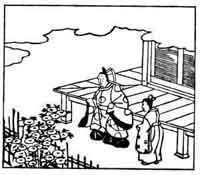Karim Al-Zand: Music: Thirteen Tanka
Thirteen Tanka
[These Days of Springtime, Longing and Loss, Cicada, That Cuckoo Who Sang]
song cycle on Japanese tanka poems
The work may be performed as a five-movement song cycle, under the title Thirteen Tanka. Alternatively, four of the movements (Blossoms, Bells, Bugs, Birds) can be performed as short independent works under the titles These Days of Springtime, Longing and Loss, Cicada and That Cuckoo Who Sang, respectively. Longing and Loss also exists in an alternate version for soprano.
The earliest examples of the Japanese poetic genre tanka (or waka) date from the 8th century. Tanka is defined structurally by the use of a specific and fixed syllable count: 31 syllables broken into lines of 5/7/5/7/7 syllables. Like the better-known (though much younger) Japanese form haiku, tanka are succinct and contemplative poems characterized by simple lyricism and poignant sentiment. They typically address themselves to the the human condition (the travails of love, considerations of mortality, and so forth) usually through subtle analogy with natural phenomenon. Thirteen Tanka collects poems by many different authors and organizes them into four sets, each focusing on a common trope in the language of tanka: blossoms, bells, birds, bugs, and boats.
 Flowers figure prominently in tanka poems and have many well-known connotations in Japanese literature. The first set of tanka, “blossoms”,” references cherry blossoms, whose striking beauty and transience signify the impermanence of life. In contrast, chrysanthemums are associated with sorrow and grief, while plum blossoms are harbingers of spring. The second set, “bells,” includes two poems by the 10th century female poet Izumi Shikibu, written upon the death of her lover. The tolling of bells frequently references the passage of time, particularly in the context of lamentation. The third set combines two tanka about the cuckoo bird (hototogisu), the song of which is associated with the longing of departed spirits to return to their loved ones still living. The fourth set “bugs” uses a poem about the cicada, an insect seen as a symbol of reincarnation and, because of its peculiar life cycle, evanescence. The last set, “boats,” unites four tanka that use the seafaring journey as a metaphor for life and love.
Flowers figure prominently in tanka poems and have many well-known connotations in Japanese literature. The first set of tanka, “blossoms”,” references cherry blossoms, whose striking beauty and transience signify the impermanence of life. In contrast, chrysanthemums are associated with sorrow and grief, while plum blossoms are harbingers of spring. The second set, “bells,” includes two poems by the 10th century female poet Izumi Shikibu, written upon the death of her lover. The tolling of bells frequently references the passage of time, particularly in the context of lamentation. The third set combines two tanka about the cuckoo bird (hototogisu), the song of which is associated with the longing of departed spirits to return to their loved ones still living. The fourth set “bugs” uses a poem about the cicada, an insect seen as a symbol of reincarnation and, because of its peculiar life cycle, evanescence. The last set, “boats,” unites four tanka that use the seafaring journey as a metaphor for life and love.
The versions of the poems used here are largely my own adaptations and modernizations of early English translations. Half are drawn from the most famous collection of tanka, the early 13th century Ogura Hyakunin Isshu, an anthology of one hundred poems by one hundred poets. The final poem in the first set (Blossoms), “Winter? Spring? Who knows?” is one of the first English language tankas, written in 1916 by German-Japanese writer and critic Sadakichi Hartmann. The first poem in the last set (Boats), “To what shall I compare,” is probably the best known of all tanka, and presents a perfect distillation of this intimate poetic genre.
Earlier versions of the first four movements, under the titles These Days of Springtime, Longing and Loss, Cicada and That Cuckoo Who Sang were commissioned by the River Oaks Chamber Orchestra for their annual “Literary and Musical Offrenda” performances in conjunction with Día de los Muertos. During Día de los Muertos families create ofrendas or altars to remember and honor the memory of their ancestors. ROCO and Musiqa collaborated to create short original contemporary, classic compositions as musical ofrendas. Inprint also presented original readings. Longing and Loss uses tanka written by tenth century poet Izumi Shikibu on the death of her lover. These Days of Springtime uses three diverse tanka, all united by floral imagery. That Cuckoo Who Sang uses an anonymous Tanka from the Kokinshu (905) and from Kyogoku Tamekane (1254-1332).
DATE
2013
DURATION
10 minutes
INSTRUMENTATION
baritone (Bb2–F4), oboe, viola, cello
MOVEMENTS
Blossoms
Bells
Birds
Bugs
Boats
COMMISSION
River Oaks Chamber Orchestra
PREMIÈRE
October 25, 2011, October 30, 2012, October 29, 2013, October 28, 2014, Lawndale Art Center, Houston TX
February 6, 2013, Duncan Recital Hall, Houston TX
AUDIO EXCERPTS
SCORE
PDF
